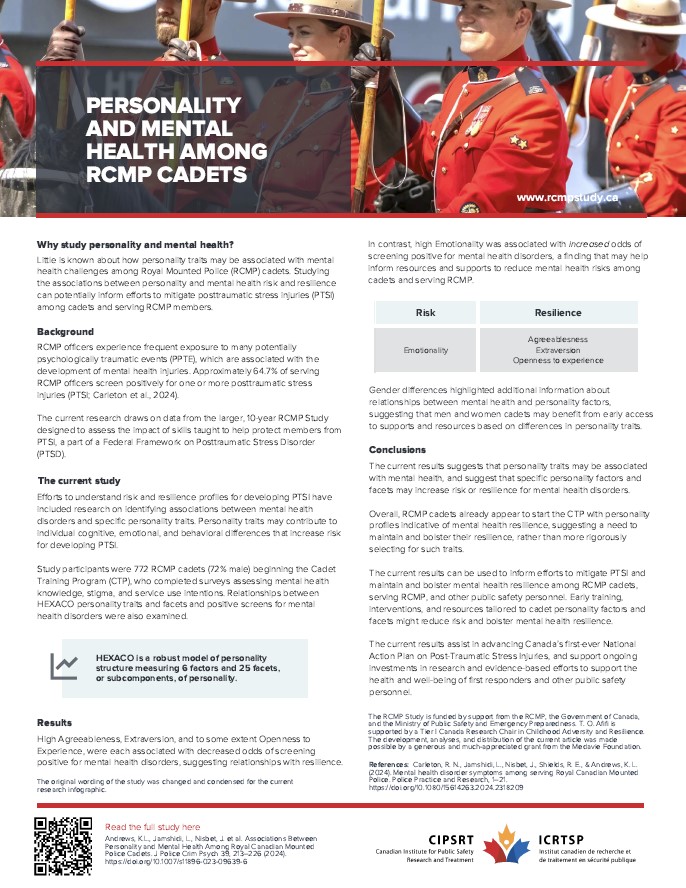Research Summaries
Why was the study done?
Royal Canadian Mounted Police (RCMP) officers report frequent exposures to many potentially psychologically traumatic events (PPTE), which are associated with the development of mental health injuries. Approximately 64.7% of serving RCMP officers screen positively for one or more posttraumatic stress injuries (PTSI; Carleton et al., 2024). Efforts to understand risk and resilience profiles for developing PTSI have included research focused on identifying associations between mental health disorders and specific personality traits. Personality traits may contribute to individual cognitive, emotional, and behavioral differences that increase risk for developing PTSI.
Personality factors are often used to try to predict resilience to psychological harm. Little is known about the associations between mental health disorders and personality among RCMP cadets starting the Cadet Training Program (CPT) and how personality traits may be meaningfully and differentially associated with mental health challenges.
The current study is designed to 1) determine the relationship between HEXACO personality factors and facets and positive screens for mental health disorders among RCMP cadets at the start of the CTP; and, 2) examine differences in relationships between personality and mental health based on gender.
What was done in the study?
The current research is part of a larger RCMP Study designed to assess the impact of skills taught to help protect members from posttraumatic stress injuries (PTSI). A research summary of the previously published RCMP Study Protocol can be read here.
Participants were 772 RCMP cadets (72% male) beginning the CTP, who completed surveys assessing mental health knowledge, stigma, and service use intentions. Relationships between personality (Honesty-Humility, Emotionality, Extraversion, Agreeableness, Conscientiousness, Openness to Experience) and positive screens for mental health disorders (i.e., posttraumatic stress disorder, generalized anxiety disorder, major depressive disorder, social anxiety disorder, panic disorder, alcohol use disorder) were also examined.
What did we find out?
Several HEXACO personality factors and facets were associated with mental health disorders. The relationship patterns allude to possible risk and resilience factors associated with personality factors and facets.
High Agreeableness, Extraversion, and to some extent Openness to Experience, were each associated with decreased odds of screening positive for mental disorders, suggesting relationships with resilience. In contrast, high Emotionality was associated with increased odds of screening positive for mental disorders and may help inform resources and supports to reduce mental health risks among cadets and serving RCMP.
Examining the facet-level traits and gender differences highlighted additional information about relationships between mental health and HEXACO factors. Men and women cadets may benefit from early access to supports and resources based on differences in personality traits.
Where do we go from here?
The current results provide novel evidence of associations between cadets’ HEXACO personality factors, facets, and mental health disorders, which suggests that personality traits may be meaningfully and differently associated with mental health and identify specific personality factors and facets that may increase risk or resilience for mental health disorders.
Overall, RCMP cadets already appear to start the CTP with personality profiles indicative of mental health resilience, suggesting a need to maintain and bolster their resilience, rather than more rigorously selecting for such traits.
The current results can be used to inform efforts to mitigate PTSI and maintain and bolster mental health resilience among RCMP cadets, serving RCMP, and other public safety personnel. Early training, interventions, and resources tailored to cadet personality factors and facets might reduce risk and bolster mental health resilience. Further longitudinal research results, which the ongoing RCMP Study will provide, are needed to understand the role of personality in the development of mental health disorders over time.
The current study results help to continue advancing Canada’s first-ever National Action Plan on Post-Traumatic Stress Injuries, including additional investment to support the health and well-being of first responders and other public safety personnel.
References
Carleton, R. N., Jamshidi, L., Nisbet, J., Shields, R. E., & Andrews, K. L. (2024). Mental health disorder symptoms among serving Royal Canadian Mounted Police. Police Practice and Research, 1–21. https://doi.org/10.1080/15614263.2024.2318209
The RCMP Study is funded by support from the RCMP, the Government of Canada, and the Ministry of Public Safety and Emergency Preparedness. The development, analyses, and distribution of the current article was made possible by a generous and much-appreciated grant from the Medavie Foundation.
The original wording of the study was changed and condensed for the current research summary.
Original study:
Andrews, K.L., Jamshidi, L., Nisbet, J. et al. Associations Between Personality and Mental Health Among Royal Canadian Mounted Police Cadets. J Police Crim Psych 39, 213–226 (2024). https://doi.org/10.1007/s11896-023-09639-6
Prepared by K.L. Andrews
